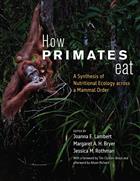How Primates Eat: A Synthesis of Nutritional Ecology across a Mammal Order
- Publisher : University of Chicago Press
- Illustrations : 128 b/w illus
Our customers have not yet submitted a review for this title - click here to be the first to write a review
Description:
Exploring everything from nutrients to food acquisition and research methods, a comprehensive synthesis of the study of food and feeding in nonhuman primates.
What do we mean when we say that a diet is nutritious? Why is it that some animals can get all the energy they need from eating leaves while others would perish on such a diet? Why don't mountain gorillas eat fruit all day like chimpanzees do? Answers to these questions about food and feeding are among the many tasty morsels that emerge from this authoritative book. Informed by the latest scientific tools and millions of hours of field and laboratory work on species across the primate order and around the globe, this volume is an exhaustive synthesis of our understanding of what, why, and how primates eat what they eat. State-of-the-art information presented at physiological, behavioral, ecological, and evolutionary scales will serve as a road map for graduate students, researchers, and practitioners as they work toward a holistic understanding of life as a primate and the urgent conservation consequences of diet and food availability in a changing world.
You may also like...
Chimpanzee Memoirs: Stories of Studying and Saving Our Closest Living Relatives
Ross, S.; Hopper, L. (Eds)
Price £68.00
Owl Monkeys: Biology, Adaptive Radiation, and Behavioral Ecology of the Only
Fernandez-Duque, E. (Ed.)
Price £149.99
Contribution a la Craniologie Comparee des Primates: Les genres Colobus Illiger
Verheyen, W.N.
Price £25.00
The Primates Symposia of the Zoological Society of London No. 10
Napier, J.; Barnicot, N.A. (Eds).
Price £15.00









